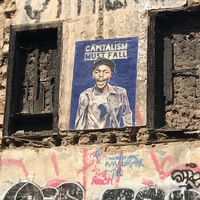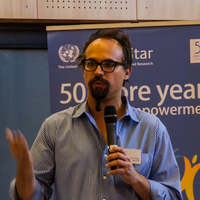Papers by Bjørn Thomassen

Religion and society, Sep 1, 2023
Exemplarity is one of those startlingly interesting ideas that deserves to be up there with 'powe... more Exemplarity is one of those startlingly interesting ideas that deserves to be up there with 'power' as a foundational concept for the social sciences. Exemplarity is memory, learning, and mimesis; it is self-recognition in the Other, and therefore key to theory of mind. One of the curious things about exemplarity is how pervasively we encounter it in its multiple, material, and ideational forms; as copies, repetitions, iterations, duplications, models, seriations, similes, icons-the list goes on. Examples (of some sort) can always be found. Th e power of the example for cultural reproduction in this broad sense is something that Andreas Bandak, with coeditor Lars Højer, has examined before in a special issue for the Journal of the Royal Anthropology Institute. Th ere, the editors propose fruitful explorations of the diff erences between evidence and example, and between 'good examples' and 'mere examples'. Th ey also note the continuity between theories of exemplarity and scholarly forms of production. As theory stands or falls on the power of its (counter)example, "it is through the example that both reality and analysis are thought and, equally importantly, reconfi gured" (Højer and Bandak 2015: 3). Exemplarity has broad purchase, but in Exemplary Life Bandak focuses on the power of example in a specifi cally religious context. Th e book revolves around the exemplary life of Myrna Nazzour, a Christian woman from Soufanieh in Damascus who receives various miraculous signs (stigmata, apparitions, exuding of oil), and whose home has become a shrine. Among her followers Myrna is celebrated both for her gendered ordinariness-her pious life as a wife and mother-and for the miraculous occurrences that project her faith into the realm of the extraordinary, making her into an exemplary fi gure. Over the course of his research, Bandak develops a warm working relationship with Myrna and various members of her faithful community, and becomes a frequent visitor in the sacred space of her family home. Gaining such access to a living saint is surely an extraordinary situation for any anthropologist of religion to fi nd themselves in, and Bandak has honored it with an equally extraordinary book. Exemplary Life interweaves sensitive ethnographic descriptions with deep erudition, off ering page aft er page of philosophical and anthropological insight. It is a wonderful instance This article is available open access under a CC BY-NC-ND 4.0 license as part of Berghahn Open Anthro, a subscribe-to-open model for APC-free open access made possible by the journal's subscribers.

Philosophia, Feb 1, 2012
This article argues that we must abandon the still predominant view of modernity as based upon a ... more This article argues that we must abandon the still predominant view of modernity as based upon a separation between the secular and the religious-a "separation" which is allegedly now brought into question again in "postsecularity". It is more meaningful to start from the premise that religion and politics have always co-existed in various fields of tension and will continue to do so. The question then concerns the natures and modalities of this tension, and how one can articulate a publically grounded reason with reference to it. It will first be argued that this question cannot be articulated, let alone fully answered, from the position developed by John Rawls. A different approach will then be developed, building on the writings of Eric Voegelin. This involves a much more serious engagement with the classical tradition in thought and philosophy than found in Rawls. It also implies much more than a "pragmatic" recognition of religion as a possible source for overlapping consensus, since for Voegelin a true, balanced rationality can only depart from an experientially grounded encounter with the transcendent.
Comparative Studies in Society and History, Jul 1, 2012
Antropologi, Dec 20, 2021
Schismogenesis and schismogenetic processes: Gregory Bateson reconsidered with a special view to ... more Schismogenesis and schismogenetic processes: Gregory Bateson reconsidered with a special view to the political dimensions of schismogenesis Outline 1) Bateson and schismogenesis: an introduction 2) Schismogenesis in politics, some further observations/suggestions 3) How to overcome schismogenesis? 4) Communication, epistemology and schismogenesis: differentiation and undifferentiation
History of the Human Sciences, Jul 1, 2017
This article argues that two important thinkers of the 20th century, Gregory Bateson (1904-80) an... more This article argues that two important thinkers of the 20th century, Gregory Bateson (1904-80) and Eric Voegelin (1901-85), developed a set of ideas that are of importance to the history of the human sciences. The article also argues that their ideas are, in essential ways, comparable and display similarities that have not yet been discussed within the larger history of the human sciences. The aim of the article is to show how the diagnostic terms provided by Bateson and Voegelin complement each other toward an understanding of underlying tensions and social pathologies of contemporary civilization.
Cambridge University Press eBooks, Dec 31, 2018
Cambridge University Press eBooks, Dec 31, 2018
RePEc: Research Papers in Economics, Jun 22, 2007
The article turns to classical economic insights on the division of labor and to institutional re... more The article turns to classical economic insights on the division of labor and to institutional reasoning to identify some costs and benefits of Open Source Software (OSS) and proprietary software production. It suggests that, thanks to its licenses, OSS favors market expansion more than proprietary software does by tapping into spontaneous work input. The spontaneous tapping leads to a division of labor that exhibits what the article calls redundant economies. By generating a circle of knowledge growth, reuse, and sharing, redundant economies lead to increasing returns, which are crucial for economic growth.
Social Sciences and Missions
Hau: The Journal of Ethnographic Theory, Jun 15, 2017
Information Technology for Development, Apr 1, 2008
The article turns to classical economic insights on the division of labor and to institutional re... more The article turns to classical economic insights on the division of labor and to institutional reasoning to identify some costs and benefits of open source software (OSS) and proprietary software production. It suggests that, thanks to its licenses, OSS favors market expansion more than proprietary software does by tapping into spontaneous work input. The spontaneous tapping leads to a division of labor that exhibits what the article calls redundant economies. By generating a circle of knowledge growth, reuse, and sharing, redundant economies lead to increasing returns, which are crucial for economic growth.
Cambridge University Press eBooks, Dec 31, 2018
Critique of Anthropology, Mar 1, 2015
ROMEO (act 5, scene 1) You're this poor and wretched and still afraid to die? Your cheeks are thi... more ROMEO (act 5, scene 1) You're this poor and wretched and still afraid to die? Your cheeks are thin because of hunger. I can see in your eyes that you're starving. Anyone can see that you're a beggar. The world is not your friend, and neither is the law. The world doesn't make laws to make you rich. So don't be poor. Break the law, and take this money. (he holds out money) APOTHECARY I agree because I'm poor, not because I want to. ROMEO I pay you because you're poor, not because you want me to buy this. [APOTHECARY gives ROMEO the poison] "Most relationships among men can be considered under the category of exchange. Exchange is the purest and most concentrated form of all human interactions in which serious interests are at stake" Georg Simmel. "To accept a gift is to be bound to the giver" Arnold van Gennep.

European Journal of Social Theory, Jan 4, 2013
This article argues that anthropology may represent untapped perspectives of relevance to social ... more This article argues that anthropology may represent untapped perspectives of relevance to social theory. The article starts by critically reviewing how anthropology has come to serve as the ‘Other’ in various branches of social theory, from Marx and Durkheim to Parsons to Habermas, engaged in a hopeless project of positing ‘primitive’ or ‘traditional’ society as the opposite of modernity. In contemporary debates, it is becoming increasingly recognized that social theory needs history, back to the axial age and beyond. The possible role of anthropology in theorizing modernity receives far less attention. That role should go much beyond representing a view from ‘below’ or a politically correct appreciation of cultural diversity. It involves attention to key theoretical concepts and insights developed by maverick anthropologists like Arnold van Gennep, Marcel Mauss, Victor Turner and Gregory Bateson, concepts that uniquely facilitate an understanding of some of the underlying dynamics of modernity.

Introduction: The Changing Faces of Rome ISABELLA CLOUGH MARINARO AND BJORN THOMASSEN Part I. Rom... more Introduction: The Changing Faces of Rome ISABELLA CLOUGH MARINARO AND BJORN THOMASSEN Part I. Rome: The Local and the Global City 1. Diversely Global Rome BJORN THOMASSEN AND PIERO VERENI 2. The Liberal, the Neoliberal and the Illiberal: Dynamics of Diversity and Politics of Identity in Contemporary Rome MICHAEL HERZFELD 3: Rome as a Global City: Mapping New Cultural and Political Boundaries PIERLUIGI CERVELLI 4. Housing and Homelessness in Contemporary Rome PIERPAOLO MUDU Part II. Changing Faces, Changing Places 5. Torpignattara/Banglatown: Processes of Re-urbanization and Rhetorics of Locality in an Outer Suburb of Rome ALESSANDRA BROCCOLINI 6. Foreign Pupils, Bad Citizens. The Public Construction of Difference in a Roman School PIERO VERENI 7. Evicting Rome's Undesirables: Two Short Tales ISABELLA CLOUGH MARINARO AND ULDERICO DANIELE 8. The Rootedness of a Community of Xoraxane Roma in Rome MARCO SOLIMENE 9. Ways of Living in the Market City. Bufalotta and the Porta di Roma Shopping Center CARLO CELLAMARE Part III. Rome and its Fractured Modernities 10. Roma, Citta Sportiva SIMON MARTIN 11. Football, Romanita and the Search for Stasis MARK DYAL 12. Rome's Contemporary Past VALERIE HIGGINS Part IV. The Informal City 13. The Self-Made City CARLO CELLAMARE 14. Marginal Centers: Learning from Rome's Periphery FERRUCCIO TRABALZI 15. Residence Roma: Senegalese Immigrants in a Vertical Village CRISTINA LOMBARDI DIOP 16. Where is Culture in Rome? Self-Managed Social Centers and the Right to Urban Space PIERPAOLO MUDU 17. Greening Rome: Rediscovering Urban Agriculture FERRUCCIO TRABALZI Contributors Index











Uploads
Papers by Bjørn Thomassen